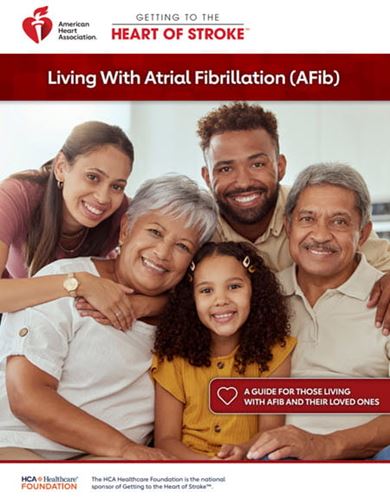What are the Symptoms of Atrial Fibrillation?
Video: Learn about AFib and your heart
The most common symptom: a quivering or fluttering heartbeat
Atrial fibrillation, also called AFib or AF, is the most common type of irregular heartbeat. The abnormal firing of electrical impulses causes the atria (the top chambers in the heart) to quiver (or fibrillate). View an animation of AFib.
Additional common symptoms of AFib
Sometimes people with AFib have no symptoms and their condition is only detectable upon physical examination. Others may experience one or more of these symptoms:
- General fatigue
- A rapid and irregular heartbeat
- Fluttering or “thumping” in the chest
- Dizziness
- Shortness of breath and anxiety
- Weakness
- Faintness or confusion
- Fatigue when exercising
- Sweating
- Chest pain or pressure (This is a medical emergency. You may be having a heart attack. Call 911 immediately if you have one of these feelings.)
![]()
Track your AFib symptoms (PDF) | Spanish (PDF)
Are there different types of AFib?
There are different types of AFib. The symptoms are generally the same, although the duration of the AFib and underlying reasons for it can help medical practitioners classify the type of AFib problems.
- Paroxysmal fibrillation is when the heart returns to a normal rhythm on its own, or with intervention, within seven days of abnormality. People who have this type of AFib may have episodes only a few times a year or their symptoms may occur every day. These symptoms are very unpredictable and can often turn into a permanent form of AFib.
- Persistent AFib is an irregular rhythm that lasts for longer than seven days. This type of AFib will not return to a normal sinus rhythm on its own and will require some form of treatment.
- Longstanding AFib is when the heart is consistently in an irregular rhythm for longer than 12 months.
- Permanent AFib occurs when the condition lasts indefinitely, and the patient and doctor have decided not to continue trying to restore a normal rhythm.
- Nonvalvular AFib is AFib not caused by a heart valve issue.
Over a period of time, paroxysmal fibrillation may become more frequent and longer lasting. This sometimes leads to permanent or chronic AFib.
All types of AFib can increase your risk of stroke. Even if you have no noticeable symptoms, you are nearly five times more likely to have a stroke than someone who doesn’t have AFib.
Common AFib-related terms
You may encounter these terms when discussing your symptoms and treatment with health care professionals.
- Sinus rhythm: The sinus rhythm is the heart’s rhythm. The sinus node in the heart creates an electrical impulse that causes the heart to beat.
- Bradycardia: A slower than normal heart rate.
- Tachycardia: A faster than normal heart rate.
- Atrial flutter: A type of abnormal heart rhythm that is not as common as AFib.
- Palpitations: A feeling that your heart is racing or pounding. Palpitations can be caused by diet, stress and health conditions. Health care professionals can help determine the cause.
How are heart attack symptoms different from AFib symptoms?
Fluttering and palpitations are symptoms of AFib. Those feelings are the key difference between AFib and a heart attack. But many heart problems have similar warning signs. If you think you may be having a heart attack, don’t delay. Get emergency help by calling 911 immediately.
A heart attack is a blockage of blood flow to the heart. This often is caused by a clot or buildup of plaque lodging in the coronary artery (a blood vessel that carries blood to part of the heart muscle). A heart attack can damage or destroy part of your heart muscle. Some heart attacks are sudden and intense. Most start slowly, with mild pain or discomfort. Often people affected aren’t sure what's wrong and wait too long before getting help.
People living with AFib should know warning signs of a heart attack or stroke
Having AFib can put you at an increased risk for stroke and heart attack. Here are the warning signs you should be aware of:
Heart attack warning signs
Chest discomfort
Most heart attacks involve discomfort in the center of the chest that lasts more than a few minutes, or that goes away and comes back. It can feel like uncomfortable pressure, squeezing, fullness or pain.
Discomfort in other areas of the upper body
Symptoms can include pain or discomfort in one or both arms, the back, neck, jaw or stomach.
Shortness of breath
With or without chest discomfort.
Other signs
Breaking out in a cold sweat, nausea or lightheadedness.
Stroke warning signs
Spot a stroke F.A.S.T., whether these warning signs are what you are feeling or you notice them in someone else:
- Face drooping: Does one side of the face droop, or is it numb? Ask the person to smile.
- Arm weakness: Is one arm weak or numb? Ask the person to raise both arms. Does one arm drift downward?
- Speech difficulty: Is their speech slurred? Are they unable to speak, or are they hard to understand? Ask the person to repeat a simple sentence, like "The sky is blue." Could they repeat the sentence correctly?
- Time to call 911: If the person shows any of these symptoms, even if the symptoms go away, call 911 and get them to the hospital immediately.
Call 911 immediately if you notice one or more of these symptoms, even if they are temporary or seem to disappear.







